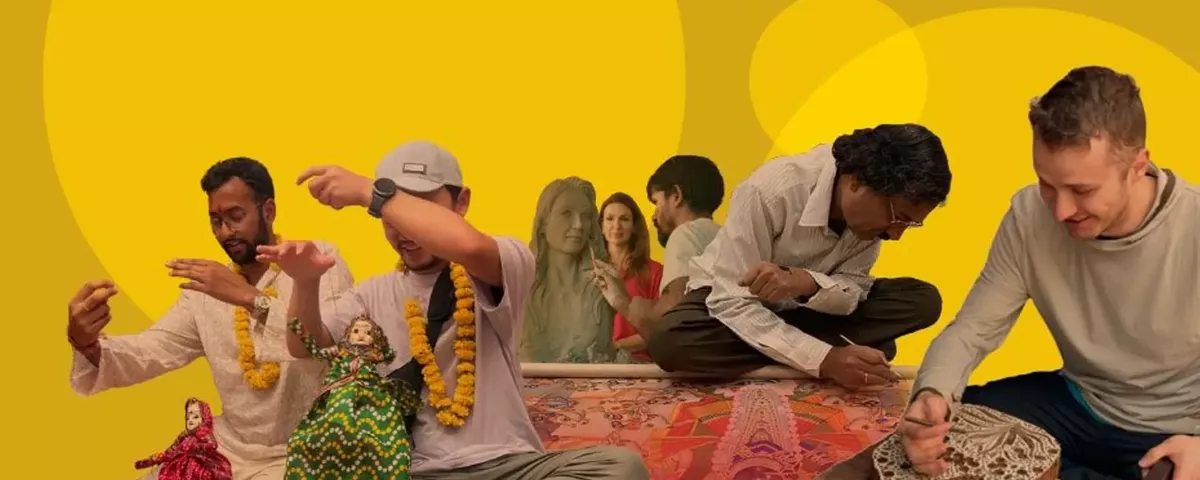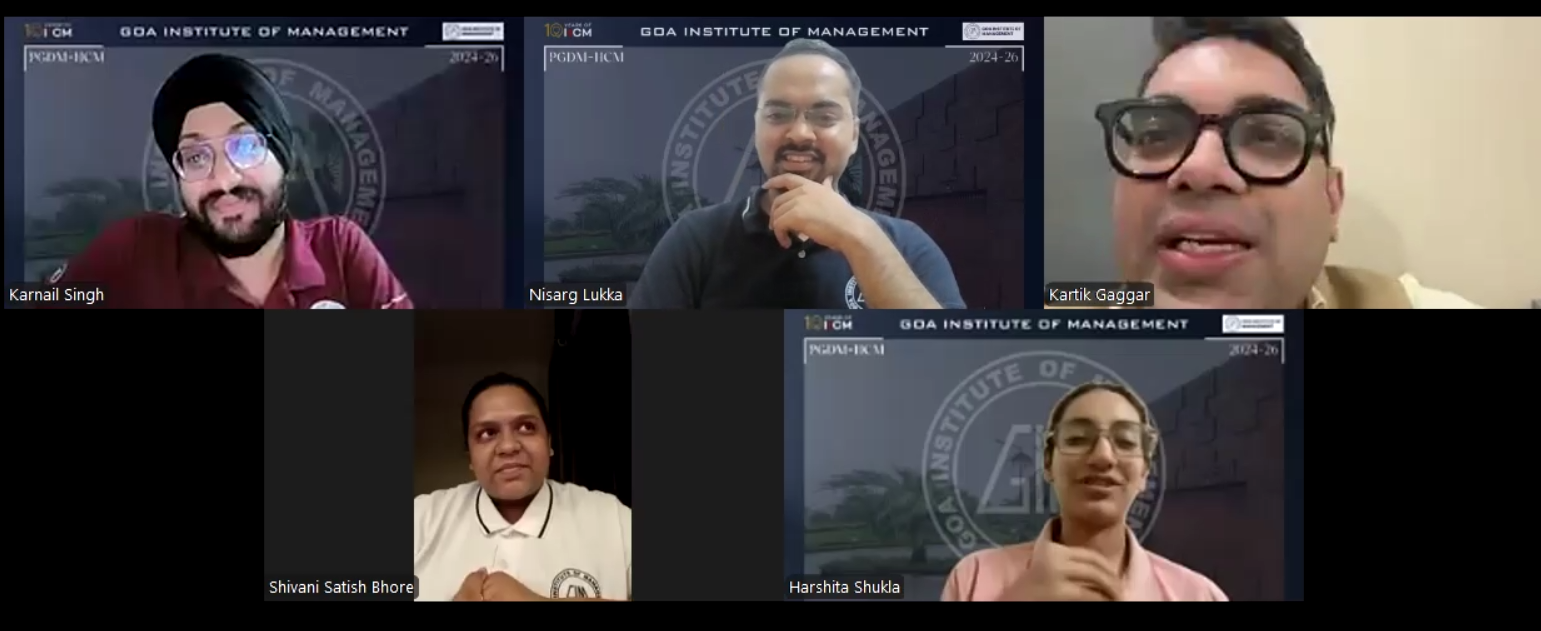



Keep this story going! Share below!
Rooftop is a social-enterprise education platform that connects learners with verified Indian folk and tribal master artists through curated live, on-demand, and at-home courses. By turning teaching into predictable, fairly paid work and delivering authentic, outcomes-based arts education, Rooftop advances SDG 8: Decent Work & Economic Growth* and *SDG 4: Quality Education. As these practices take root in everyday spaces, it also strengthens **SDG 11: Sustainable Cities & Communities* by keeping heritage arts alive, valued, and locally viable.
Rooftop is a Jaipur-born, India-wide education platform that transforms India’s folk and tribal arts into structured, high-trust learning. Founded in 2019 from the groundwork of Rajasthan Studio and scaled during the pandemic pivot, it connects learners everywhere with verified master artists of Madhubani, Warli, Gond, Pattachitra, Cheriyal, and more. The innovation is not a generic marketplace; it is a curated learning system where heritage practitioners teach in formats people can actually access: live online, on-demand, and in carefully designed at-home sessions.
The how is intentionally practical. Rooftop scouts and vets master artists; co-creates syllabi that progress from first motifs to finished compositions; supports pedagogy, materials, and safety; standardises scheduling and feedback; and ensures transparent, timely payouts. By transforming teaching into predictable, fairly compensated work, the platform directly advances SDG 8: Decent Work & Economic Growth. Artists transition from seasonal gigs and middlemen to a professional identity, steadier calendars, and reputation capital that they can leverage for commissions, residencies, and community projects.
For learners, the same design produces authentic, outcomes-based instruction that aligns with SDG 4: Quality Education. Students meet living practitioners, see techniques in a cultural context, and progress through a clear ladder of mastery rather than one-off “activity” sessions. As these practices take root in schools, homes, and neighbourhood spaces, they reinforce SDG 11: Sustainable Cities & Communities. Local supply shops see increased demand, classrooms host artists, and heritage becomes a weekly habit rather than an annual spectacle. The specific, innovative solution is a curated, pedagogy-first bridge between tradition and today; one that keeps culture alive by making dignified teaching and rigorous learning possible at scale.

Kartik Gaggar traces Rooftop’s spark to a simple human need: meaningful experiences that reconnect people with themselves and with what they love. As he put it in our interview, “the idea of experiences… gives you the ability to be a part of a journey which helps you to connect with yourself. Number one. Number two, [it] helps you to connect with something you like.” That philosophy, which views experience as a connection, guided the early Rajasthan Studio experiments and later the digital pivot, shaping Rooftop as a curated, pedagogy-first bridge between living masters and everyday learners.
Equally formative was Kartik’s insistence on patience and process. “I always believed in processes… one step at a time,” he said. During the platform’s evolution, that became customer-back discipline: “you take one step at a time; you understand what the customer wants.” The pandemic made the stakes plain: if fairs stop and middlemen disappear, artists still need dignified work and learners still need high-trust instruction. Rooftop’s formats- live, on-demand, and at-home- grew from that steady, iterative listening.
The deepest motivation, though, came from artists’ lives. Kartik describes visiting Jaipur’s traditional quarters and meeting a puppeteer navigating daily debt cycles: “someone told me… he digs his own well every day, with the debts.” The details stayed with him: buying staples in tiny quantities at a premium; “He is paying more than the basmati price,” because irregular income makes bulk impossible. Those moments reframed the venture’s purpose: design a path where teaching becomes predictable, fairly paid work, so skill no longer depends on chance. Rooftop’s inspiration is therefore practical and moral at once; build a system that honors mastery, restores agency, and lets culture earn its keep, advancing SDG 8 first, and reinforcing SDG 4 and SDG 11 through authentic, accessible learning.
In the near term, Rooftop changed the cadence of work for traditional artists; irregular fair-season gigs gave way to scheduled classes, defined curricula, and on-time payouts. Within the first 12 to 18 months of rollout, artists reported steadier calendars and fewer middlemen; preparation shifted from improvised demonstrations to lesson plans and learner feedback; families and schools booked live online sessions while new at-home cohorts formed in neighborhoods. On the learner side, beginners progressed from first motifs to finished compositions; the same masters saw repeat cohorts and cross-enrolment into Maestro courses, signaling authentic learning rather than one-off entertainment.
Over the longer term, the model scaled without hollowing out the craft. Company materials indicate 2,100+ artists across 166+ cities, 5,000+ learning experiences since 2020, and 50,000+ learners in 30+ countries; partnerships with institutions and classrooms embedded folk and tribal arts into timetables; local supply shops felt demand for nib pens, natural pigments, and papers as practice became a weekly habit. Evidence of durability shows up in behavior; artists choosing to teach again the following term, schools renewing programs, learners advancing to deeper courses with the same master, and neighborhood cohorts inviting additional families; all outcomes consistent with a curated, pedagogy-first system.
This impact advances the UN SDGs in tangible ways. SDG 8: Decent Work & Economic Growth is served when master practitioners earn predictable income and professional identity through transparent bookings and timely payouts; SDG 4: Quality Education is delivered through sequenced curricula that place technique in cultural context; SDG 11: Sustainable Cities & Communities is strengthened when heritage moves from annual spectacles to everyday practice at kitchen tables, classrooms, and community spaces
Because the business built a curated, pedagogy-first platform: not an open marketplace: learners find the right class faster and come back for deeper levels; conversion and repeat enrolments improve, and revenue diversifies across live cohorts, Maestro courses, on-demand lessons, institutional programs, and at-home formats. The at-home model taps into hyperlocal neighbourhood demand, while the digital catalog serves over 30 countries, reducing seasonality and smoothing cash flows. Institutional credibility with schools, museums, and enterprises opens B2B channels that are larger, longer-term, and easier to forecast.
Because Rooftop standardised operations: discovery, scheduling, materials, feedback, and timely payouts, it retains high-quality masters on the supply side, lowering acquisition and training costs and protecting course quality. That operational backbone frees the core team to launch adjacent offerings (e.g., deep-dive Maestro series, recorded modules, curated kits/books) and to enter new cities without rebuilding processes each time. Public visibility from mainstream entrepreneurship platforms has translated into inbound partnerships and exploratory investor conversations, expanding the pipeline for enterprise contracts and potential growth capital.
Because the company invested in artist relations, pedagogy design, and multi-city operations, it has developed a stable internal team with clearer roles, fewer fire drills, and better week-to-week planning —factors that support employee well-being and retention. The same discipline compounds brand trust: institutions renew programs, neighbourhood cohorts invite additional families, and artists co-create new courses. In short, by designing for dignity and learning outcomes first, Rooftop unlocked the business results that follow: stickier demand, steadier supply, broader markets, and a roadmap for sustainable growth.
Because Rooftop turns heritage teaching into predictable, fairly paid work, society benefits first through livelihoods; traditional artists who once relied on seasonal fairs and middlemen now earn through scheduled classes with on-time payouts. Who: master practitioners of Madhubani, Warli, Gond, Pattachitra, Cheriyal; What: curated live, on-demand, and at-home courses; When: founded in 2019 and scaled through the pandemic years to the present; Where: Jaipur-born, operating across India with global access online; How: artist vetting, co-created syllabi, standardised logistics, and transparent payment. This directly advances SDG 8: Decent Work & Economic Growth; teaching becomes dignified employment, artists gain professional identity and repeat cohorts, and households plan with steadier cash flows rather than irregular gigs.
Because the same design centres on pedagogy and progression, communities receive authentic, outcome-based arts education; learners meet living masters, see technique in cultural context, and progress from initial motifs to finished compositions. Schools integrate modules into timetables; neighbourhood groups host at-home sessions; diaspora cohorts join after hours; local supply shops feel demand for nib pens, handmade papers, and natural pigments. This is SDG 4: Quality Education in practice; instruction is structured, contextual, and assessable, turning curiosity into competence and cultural literacy that outlasts a single workshop.
As participation spreads from fairs to classrooms and kitchen tables, heritage becomes a weekly habit rather than an annual spectacle; this strengthens SDG 11: Sustainable Cities & Communities. The who expands from individual artists and learners to institutions and neighbourhood networks; the what evolves from one-off entertainment to a stable ecosystem of practice; the where multiplies across cities and towns; the how remains a curated bridge that rewards quality. The long-term social effect is one of continuity with dignity; living traditions are preserved precisely because the people who carry them can now afford to continue teaching.
Get stories of positive business innovations from around the world delivered right to your inbox.
Kartik Gaggar, Founder CEO


Rooftop is a social-enterprise education platform that makes India’s folk and tribal arts learnable, and livelihoods-sustaining. It connects learners with verified master artists through live classes, deep-dive Maestro courses, on-demand lessons, and neighborhood at-home sessions. The company manages discovery, scheduling, materials, and fair payouts so artists earn predictably while students learn authentically. Operated by Slo Mo Experiences Pvt. Ltd., Rooftop serves communities across India and a growing global audience online.